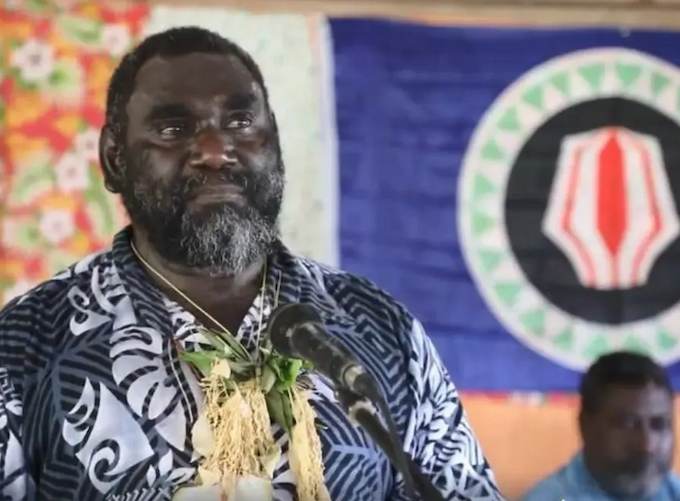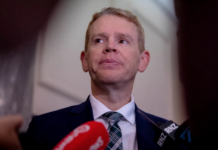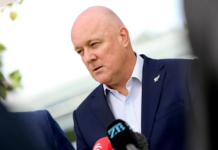
By Don Wiseman, RNZ Pacific senior journalist
The President of Bougainville, Ishmael Toroama, says he is not feeling the pressure as he seeks a second five-year term in office.
Bougainville goes to the polls next Thursday, September 4, with 404 candidates vying for 46 seats in the Parliament of the autonomous Papua New Guinea region.
Toroama is being challenged by six others — all men.
He spoke with RNZ Pacific as he continues campaigning in Central Bougainville.

Don Wiseman: Last time you and I spoke before an election, you had just been ushering a rock band around Bougainville. It’s a very different situation for you this time round.
Ishmael Toroama: Yes, indeed, it’s a totally different situation. But you know, principle never changes. Principles of everything, in terms of whatever we do, remain the same. But it changes as environment changes.
DW: What are your key planks going into this election? What are the most important things that you’re telling people?
‘Political independence’
IT: It’s what my government has done in the last five years.
I am telling them, firstly, of the political independence. Political independence has been agreed by the national constitution of Papua New Guinea, amendment on part 14, which gives the people of Bougainville the right to vote for independence referendum.
As our leaders at that time, while they were negotiating with late Kabui [first Bougainville President Joseph Kabui], they told the Papua New Guinea government that if you cannot change your constitution, then we will no longer sign a peace agreement that creates that opportunity for Papua New Guinea and Bougainville.
So what I’m telling them is it has been guaranteed by the national constitution, which created the amendment of part 14, the Organic Law on Peace Building, Bougainville Peace Agreement and the Constitution of the Autonomous Bougainville Government.
In all consultation, national constitution guarantees us to even the consultation, even through the definition of independence, which most Bougainvilleans have voted for, which has been defined by the national government, saying that it is a separate state apart from the state of Papua New Guinea.
And the United Nations must also verify that, and that is the definition which national government has given to the people of Bougainville before the actual voting happened. If you closely look at all consultation, the Bougainville Peace Agreement says after the referendum vote made by the people, the two governments will consult over the result.
What I’m telling my people is that as your fifth president in the fourth House of Representatives, we have made a consultation at Kokopo, Wabag, and in Moresby we signed the Era Kone Covenant. And latest is the Melanesian Relationship Agreement [signed at Burnham, New Zealand, in June this year].
Constitutional guarantee
Having said in order that constitutional guarantee as a guarantor guarantees the people’s right to vote for independence, that is what I’m telling them.
DW: Yes but you’re not carrying Port Moresby with you on this. Are you? You guys are not very much closer to resolution of this problem than you were five years ago.
IT: Well, that is in line with the consultation process. Whatever they say to me, I see that. It has been amended of the national constitution, then it gives us the opportunity whether the national government likes it or not.
It is a national constitution guarantee or the framework of the Bougainville Peace Agreement, and that is how I’m saying to them, whether we come into consultation, we have different views.
At least it is the constitutional guaranteed process censored by the National Constitution.

DW: There are people, including some running against you in this election, who are saying that your approach through these negotiations has been too strident, that you go into these meetings making bold statements beforehand and there’s no room to move, that you’re not giving room for negotiation.
Defining result
IT: If you look at all the consultation that we have consulted. You will look at the consultation which I am saying we are consulting over the result. The Bougainville Peace Agreement says that the consultation should be over the result.
And what is the result? It is the 97.7 percent and who has defined the 97.7 percent — it is the national government of Papua New Guinea.
I understand where they’re coming from, because if you want to retain a political power, you can make all sorts of arguments trying to say that President Toroama has not left room, [made] political spaces available.
But if you closely look at what the Bougainville Peace Agreement says, we are consulting over the result, whether these presidents or candidates are saying that I haven’t made a room.
You just look at every space that we have gone into. And a consultation, as per the Bougainville Peace Agreement, is over the result.
What is the result? It is the independence which people voted — 97.7 percent. We cannot deny the people’s power moving into the referendum saying that we want to govern ourselves. So yes, people’s power.
DW: Except you’re overlooking that that referendum is a non-binding referendum?
Where is it non-binding?
IT: Can you specifically say to me, can you give me a clause within the Bougainville Peace Agreement that it says it is a non-binding.
I’m asking you, you will not find any non-binding clause within the framework of the Peace Agreement. It has been cultivated in there by people that want to drive us away from the exact opposition of the people.
There is no clause within the political peace agreement that says non-binding. There is no clause.
DW: We’re here now, just a week out from the election. How will you go?
IT: I’m the kind of man that has process. They voted me for the last five years. And if the people wish to put me [back], the decision, the power to put people, it is democracy. They will vote for me.
If not, they can choose another president. I don’t get too much pressure, but because it has been described within the constitution of the autonomous government that a president can serve two terms, so that’s why I am running.
But I’m not in a pressure mood. I am all right.
This article is republished under a community partnership agreement with RNZ.













































